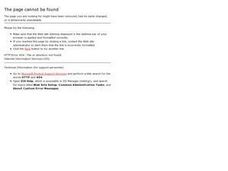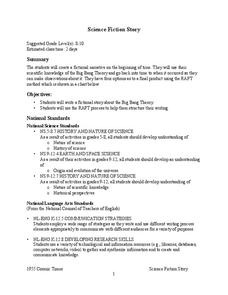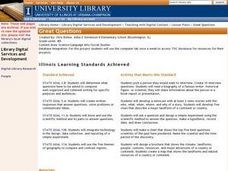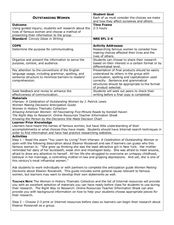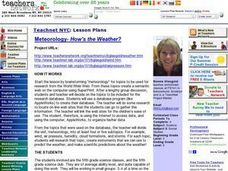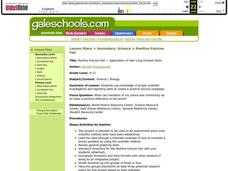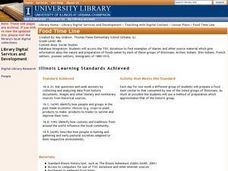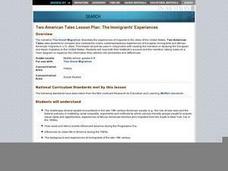Curated OER
Hamlet Research Paper: Find, Evaluate, and Select Appropriate Research Sources
Help young researchers find credible sources online. Modeling with a Google search for information about Shakespeare’s Macbeth, use a computer projector or Smart Board to show class members how weak the top three search results are....
Curated OER
The Wetlands
Complete a comparison of the wetlands found in New York and Louisiana. Using various research methods, gather data on the wetlands found in New York and Louisiana, the animals, conditions, etc. Data is used to create a brief report on...
Curated OER
Rocks and Minerals Composition Database
Fourth graders research a specific rock or mineral. They compile the facts into a database which students access for information.
NASA
Science Fiction Story
A instructional activity allows you to go back in time and see the big bang actually happen. Bazinga! In reality, pupils research the Big Bang Theory and theorize what it would be like to go back in time and see it happen....
Curated OER
Great Questions
Fourth graders research and create questions about a famous person. They create questions in a game format, create a computer generated brochure, and develop rubrics for their finished projects.
Curated OER
Outstanding Women
Research the lives of famous women in this social studies lesson. Middle schoolers use various sources to research a famous woman and create a presentation about the accomplishments of the woman. They can find the central idea throughout...
Curated OER
Race and Crime in the United States: Are We Victims of Discrimination or Antiheroes?
Using methods adopted by Public Policy Analysts (PPA) class groups define a social problem, gather evidence to document the existence of the problem, identify causes, evaluate existing policies designed to deal with the problem, develop...
Curated OER
Dinosaurs
Second graders use the internet to find information about dinosaurs. Using the information, they complete a database with where the dinosaurs lived, diet, and where bones were found. To end the instructional activity, they are given...
Curated OER
Comparing Michigan to Other States
Fourth graders work in groups of 2 or 3 and choose a state to compare with Michigan. They use the Internet to locate information on other states allowing students time to research how Michigan compare to their state and incorporate their...
Curated OER
The President's Cabinet
Eighth graders obtain information about the President's Cabinet by using a template, and exploring the bookmarked Internet sites.
Curated OER
Bats and Sound
Students create a PowerPoint presentation about animals and the sound they make. Using traditional and internet research methods, students gather information about a specific animal and the sounds that animal makes. Student information...
Curated OER
Science: How's the Weather?
Fifth graders brainstorm meteorological terms to create a semantic web using SuperPrint. For each topic, they create instruments, such as barometers or psychomotors, that they use to make scientific predictions about the weather. After...
Curated OER
How Can We Keep Our Forests Intact and Have Our Chocolate Too?
Fourth graders explore various methods of growing and harvesting rainforest foods in order to sustain its biodiversity. They discuss the various uses for trees from several viewpoints. Students research chocolate demand and land use...
Curated OER
World History: Why Civilizations Fall
Students examine factors leading to the demise of ancient civilizations. They list causes that led to the downfall of these societies. Students conduct Internet research and participate in online archaeological investigations.
Curated OER
Positive Futures Fair - Application of Year-Long Content Skills
Students demonstrate the knowledge of proper scientific investigation and reporting skills. They decide how to make a positive difference in the world using these skills.
Curated OER
Tracing the Impact of Historical Figures
Pupils use the Internet to research one historical figure. Using the information they collect, they create a display and present it to the class. They complete flowchart notes and discuss how one figure can alter the course of history.
Curated OER
Food Time Line
Fourth graders make a timeline to include the immigrants of 1880-1910. Then, in groups, they research foods consumed, purchase, and serve it to the class.
Curated OER
Comparing the Senate and the House of Commons
Young scholars research, compare and contrast the two Parliamentary houses of Canadian government. They organize their research into a series of graphic organizers and discuss their findings with peers.
Curated OER
Post War Effects on Los Angeles
Eleventh graders research before and after pictures of a specific area of downtown Los Angeles. They create a poster depicting the changes.
Curated OER
Conceptual Analysis in Economics
Students practice critical thinking skills by defending their beliefs orally in a "hot seat". In addition, they communicate their feelings about an inssue in writing.
Curated OER
Lost Lyrics of Love, Lust, and Losers
Twelfth graders explore the connection between poetry and the "real world". They are reminded of the elements used in poetic interpretation, and use them to analyze various texts.
Curated OER
The Great Migration: Two American Tales
Students compare and contrast experiences of European immigrants and African American migrants in U.S. cities. After examining the topic, they write essays evaluating the differences and similarities of the groups' experiences.


